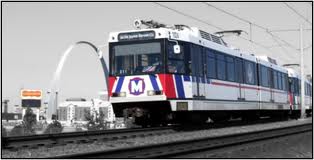 The Ferguson Commission released a copy of its nearly 200-page report online this week. Along with focus on law enforcement and court reform, transportation appears among the report’s more than three dozen “signature priorities” under the category that addresses economic opportunity.
The Ferguson Commission released a copy of its nearly 200-page report online this week. Along with focus on law enforcement and court reform, transportation appears among the report’s more than three dozen “signature priorities” under the category that addresses economic opportunity.
The Commission’s report proposed 189 calls to action to address inequality and racial disparities across the St. Louis region. The calls to action are grouped into four categories:
- Justice for All
- Youth at the Center
- Opportunity to Thrive
- Racial Equity
In the Opportunity to Thrive category, recommendations to prioritize public transportation are included among five key areas the Commission believes require urgent attention: expanding Medicaid, employment, financial empowerment, housing, and transportation.
While the report explicitly acknowledges that race plays a major role in the inequality experienced across the region, the report also recognizes that “A safe, reliable, affordable, and efficient public transportation system can increase access to health care, education, and employment” and help tackle the other inequities the panel aims to address, and that “Public transit is a key to expanding opportunity for all St. Louisans.”
The two specific calls to action regarding transportation that are highlighted in the report are recommendations to:
- Develop a State Supported Funding Plan for Public Transit,
- Identify Priority Transportation Projects for the St. Louis Region
The Commission directly calls for Missouri to develop a state funding plan for public transportation projects. The report notes that in the St. Louis region, a shortage of funding is a significant reason keeping St. Louis from pursuing any of various transportation proposals and from moving forward with transit expansion. A state funding plan is essential, the report explains, because “State funded transit development matches are required to compete for necessary federal funding and such a plan will make Missouri eligible for federal matching funds for transportation infrastructure. Federal funds, as part of a broader funding plan, are critical to the long-term success of transportation development.”
The report also cites CMT’s recently commissioned Transit Funding study when it calls for stakeholders to work together to determine which transit project(s) the region will prioritize. The report notes that such prioritization is necessary in order for the region to focus resources to successfully expand transit, and to get regional “buy-in” by elevating the importance of key projects for the region and making tangible the need and potential benefits of transit.
In the full report, the Commission expands upon its recommendations for enhancing access to transit by suggesting that use of public transportation might be incentivized by:
- Implementing a ridership program that educates individuals on how to use the system for work or education trips and demonstrates the possibilities for job access and educational trips and potential personal cost savings;
- Improving bus tracking to enhance the ease with which bus transit can fit into one’s schedule;
- Creating a reloadable transit card that removes the hurdle for exact change for each ride; and
- Enhancing the public transit amenities among current and future bus routes (e.g., bus shelters and benches).
The Ferguson Commission is a 16-member panel that was appointed by Missouri Gov. Jay Nixon in November 2014 to conduct a “thorough, wide-ranging and unflinching study of the social and economic conditions that impede progress, equality and safety in the St. Louis region.”